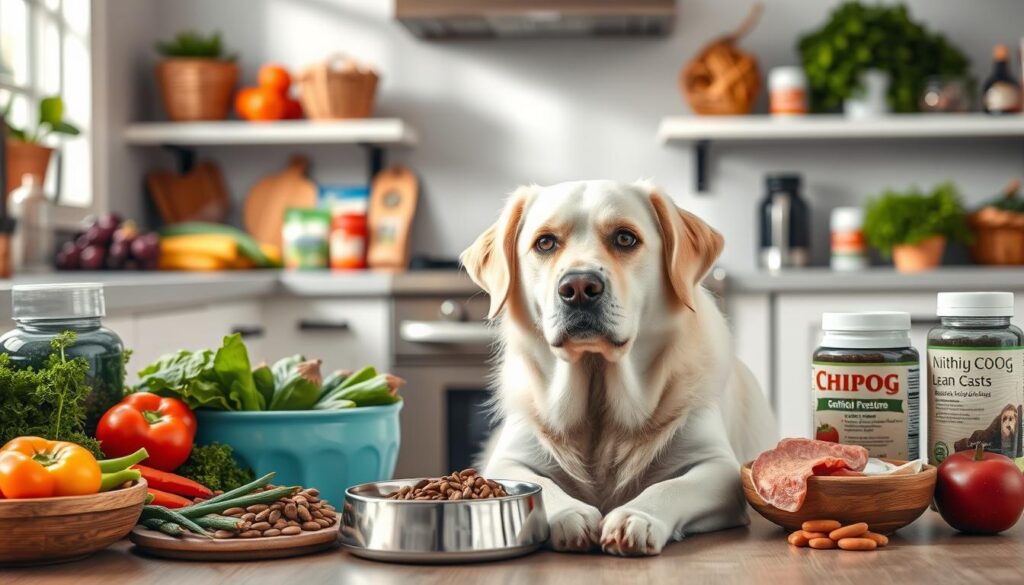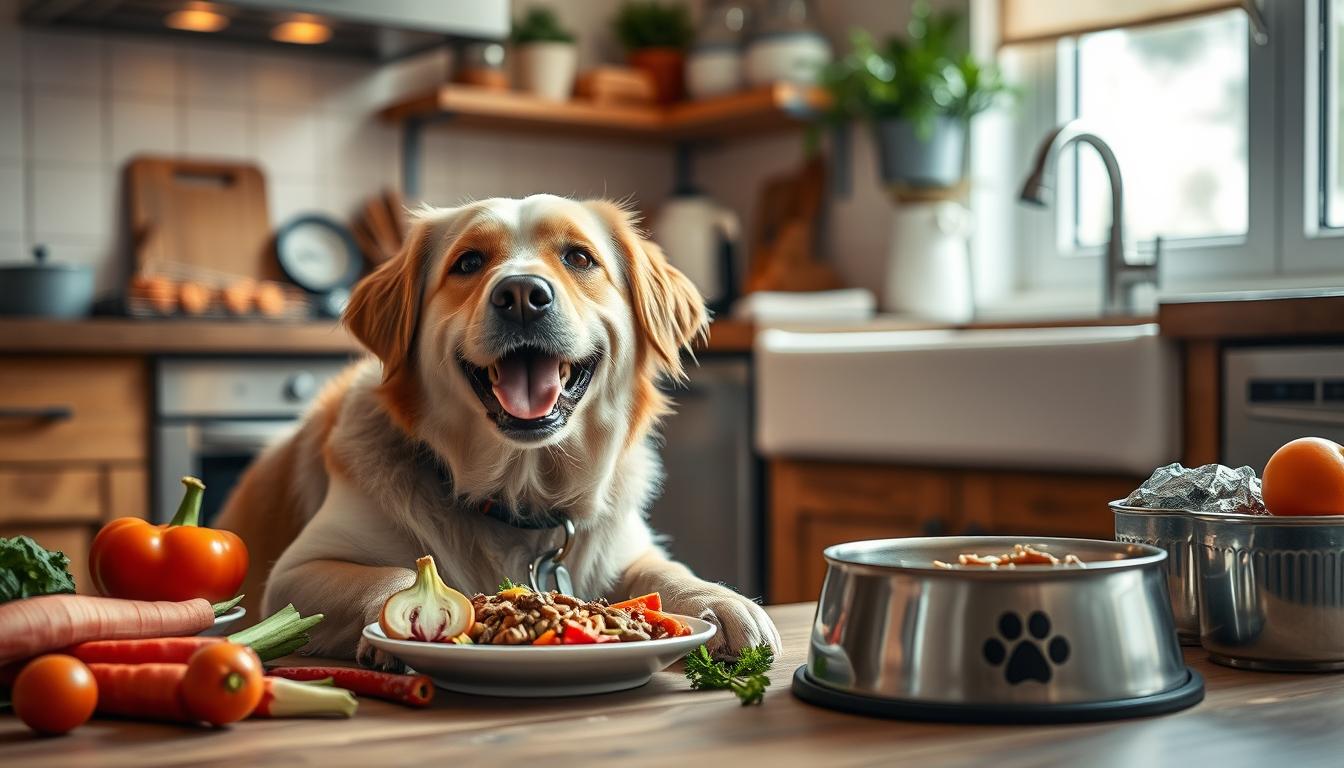As dogs get older, their food needs change. It’s important to pick the right food for senior dogs. Good nutrition helps keep them healthy and happy.
Knowing about senior dog nutrition is key to caring for older dogs. This guide will cover important topics like the best food for senior dogs. It will also help you make good choices for their diet.
Key Takeaways
- Senior dogs have unique dietary needs that differ from younger dogs.
- Choosing the best dog food for senior dogs is crucial for maintaining their health.
- Senior dog nutrition plays a significant role in preventing common health issues associated with aging.
- A well-balanced diet can help older dogs maintain a healthy weight and prevent digestive problems.
- Consulting with a veterinarian can help determine the best diet for senior dogs.
- Proper nutrition is essential for ensuring senior dogs remain happy and healthy.
Understanding Your Senior Dog’s Nutritional Needs
As dogs get older, their diet needs change. Senior dog nutrition is key to keeping them healthy. Dogs are considered seniors between 7 to 10 years old, depending on their breed and size. At this age, their metabolism slows, and their digestion gets worse.
Older dogs need a special diet. Senior dogs require a balanced mix of protein, fatty acids, and antioxidants. These help keep their energy up, support their joints, and strengthen their immune system.

- Maintaining a healthy weight to reduce the risk of obesity-related diseases
- Supporting joint health with glucosamine and chondroitin
- Providing essential vitamins and minerals to boost their immune system
Knowing your senior dog’s diet needs is crucial. Talk to your vet to find the best food for them. This ensures they get the nutrients they need for a happy, healthy life.
Signs Your Senior Dog’s Diet Needs Adjustment
As dogs get older, their diet needs change. It’s key to watch their health to see if their diet is still right. Senior dog diet tips stress the need to look for signs of diet changes. These signs might be weight changes, less energy, digestive problems, or a bad coat.
A balanced diet is vital for a senior dog’s health. Regular vet visits can spot diet problems early. This way, owners can avoid health issues and keep their dog happy and healthy.

- Weight gain or loss
- Lack of energy or enthusiasm
- Digestive issues, such as diarrhea or constipation
- Changes in coat quality, such as dullness or thinning
Recognizing these signs and getting vet advice helps owners make the right diet choices. This ensures their senior dog gets the nutrients they need for good health.
According to veterinary experts, a balanced diet is essential for maintaining a senior dog’s health, and owners should be aware of the signs that indicate a need for dietary adjustment.
By following senior dog diet tips and working with a vet, owners can help their senior dog live a happy, healthy life.
Essential Nutrients for Aging Dogs
As dogs get older, their diet needs change. Giving them nutritious meals for aging dogs is key to keeping them healthy. A balanced diet with the right nutrients helps their bodies and prevents health problems.
Aging dogs need a lot of high-quality protein to keep their muscles strong. The amount of protein they need changes with age. It’s important to choose a diet that meets these needs. Fat is also important, as it gives energy and helps the body absorb vitamins and minerals. Omega-3 fatty acids are especially good for senior dogs.
Protein Requirements
Include high-quality protein sources like chicken or salmon in nutritious meals for aging dogs. These help keep muscles strong and support health.
Fat Content Considerations
Senior dogs need a balanced fat content, including omega-3 fatty acids. These fats reduce inflammation and keep skin and coat healthy.
Vitamin and Mineral Needs
Senior dogs need specific vitamins and minerals, like more B vitamins. A balanced diet with these nutrients supports their health and prevents issues.
By giving nutritious meals for aging dogs, owners can support their pet’s health and happiness. A balanced diet with essential nutrients prevents health problems and ensures a happy life for senior dogs.
Best Dog Food for Senior Dogs: Top Recommendations
As your dog ages, their nutritional needs change. It’s crucial to give them the right food for their health. Look for top rated senior dog food that is vet recommended and meets their specific needs.
When picking vet recommended senior dog food, consider a few things. Look for ingredients that are easy to digest. Also, check for added joint support and balanced calories. Talking to your vet can help find the best food for your senior dog.
Here are some tips to help you choose the best food for your senior dog:
- Look for food that is specifically formulated for senior dogs
- Consider your dog’s individual needs and health conditions
- Choose food that is rich in nutrients and has added joint support supplements
- Consult with your veterinarian for recommendations
By giving your senior dog top rated senior dog food that is vet recommended, you help keep them healthy. This ensures they live a happy and comfortable life.
Remember, every dog is different, and what works for one dog may not work for another. Be sure to work closely with your veterinarian to find the best food for your senior dog.
Wet vs. Dry Food for Older Dogs
Choosing the right food for senior dogs can be tough. Pet owners often debate between wet and dry food. Each has its own benefits and drawbacks. The right food can greatly improve a senior dog’s health.
Senior dogs need a diet rich in nutrients like protein, fat, and fiber. Wet food is good for older dogs because it’s moist. This helps with digestion and makes food more appealing. Dry kibble, on the other hand, is better for teeth and is easy to store and serve.
Benefits of Wet Food
Wet food is great for senior dogs, especially those with dental problems or don’t drink much. It keeps them hydrated and supports their health. Wet food also tastes better, making meals more fun and reducing pickiness.
Advantages of Dry Kibble
Dry kibble is good for teeth and is easy to manage. It helps prevent tartar and supports healthy gums. It’s also cheaper and lasts longer, which is a big plus for many owners.
Combining Both Options
Maybe the best choice is to mix wet and dry food. This way, you can give your senior dog a balanced diet. Mixing foods lets you tailor the diet to your dog’s taste and health needs. Always talk to your vet to find the best food for your senior dog.
Common Health Issues and Dietary Solutions
As dogs get older, they face many health problems. Healthy food for older dogs is key to keeping them healthy. Issues like joint problems, cognitive decline, heart disease, and kidney issues are common.
Foods with glucosamine and chondroitin can help with joint health. This can reduce arthritis and other joint issues. A diet low in phosphorus is also good for dogs with kidney problems. It helps slow down kidney disease.
Here are some ways to help senior dogs with common health issues:
- Joint health: Foods with glucosamine and chondroitin
- Cognitive decline: Diets rich in omega-3 fatty acids and antioxidants
- Heart health: Foods low in sodium and saturated fats
- Kidney function: Reduced phosphorus diets
Choosing the right healthy food for older dogs can help manage these issues. This ensures they live happy and healthy lives.
How to Transition Your Senior Dog to New Food
When you introduce new food to your senior dog, a gradual transition is key. This helps avoid digestive upset. Start by mixing a small amount of the new food with their current diet. Slowly increase the new food over time.
A 7-10 day transition period is recommended. This lets your dog’s digestive system get used to the new food. Watch for signs like vomiting, diarrhea, or skin issues. Adjust the plan if you notice any problems. Managing dietary sensitivities is vital to avoid long-term health issues.
Here are some important tips for transitioning your senior dog to new food:
- Start with small amounts of new food and gradually increase the proportion
- Monitor your dog’s digestive health and adjust the transition plan as needed
- Be patient and allow your dog’s digestive system to adjust to the new ingredients
By following these tips and introducing new food gradually, you can ensure a smooth transition. This helps keep your dog healthy and happy.
Portion Control and Feeding Schedule
As dogs get older, their metabolism slows down. This affects how many calories they need. Senior dog nutrition is key to keeping them healthy. It’s important to control portions and follow a feeding schedule to avoid obesity.
Finding the right portion size depends on several things. These include the dog’s size, how active they are, and their health. Consulting with a veterinarian can help figure out the best calorie intake for your senior dog. Some older dogs do better with smaller, more frequent meals to manage digestion and keep a healthy weight.
Having a regular feeding routine is crucial for senior dogs. A consistent schedule helps their digestive system and prevents overeating. Here are some tips to follow:
- Divide your dog’s daily ration into 2-3 meals to help manage hunger and prevent overeating
- Monitor your dog’s weight and adjust their portion size accordingly
- Avoid giving table scraps or treats that can disrupt their balanced diet
By following these guidelines and talking to your vet, you can make sure your senior dog gets the right nutrition.
Remember, every dog is different, and their nutritional needs may vary. By working closely with your veterinarian and following a well-structured feeding schedule, you can help your senior dog maintain a healthy weight and enjoy a happy, healthy life.
Supplements for Senior Dogs
As dogs get older, their diet needs change. Nutritious meals for aging dogs are key to keeping them healthy. Supplements are important for their well-being. They should include joint support, omega-3 fatty acids, and antioxidants.
Essential Supplements
These supplements can help with common aging issues like joint pain and memory loss. Joint supplements can reduce inflammation and improve movement. Omega-3 fatty acids are good for the heart and may prevent some diseases.
Choosing the right supplements is important. Always talk to a vet before adding them to your dog’s diet. They can pick the best ones and make sure they won’t harm your dog’s health.
When to Use Supplements
Supplements should add to a balanced diet, not replace it. A vet can tell you when and what supplements your dog needs. By giving nutritious meals for aging dogs and the right supplements, you can keep your senior dog healthy and happy.
Special Dietary Considerations for Senior Dogs
As dogs get older, their food needs can change. This is because they might have health issues. It’s important to work with a vet to find the right food for them. Vet recommended senior dog food is key in managing these health problems.
Dogs with heart issues might need food low in sodium. Those with kidney problems might do better on low-protein diets.
A good diet can make a big difference in a senior dog’s life. Here are some important things to consider:
- Low-sodium diets for dogs with heart conditions
- Low-protein diets for dogs with kidney issues
- Easily digestible diets for dogs with sensitive stomachs
Choosing the right vet recommended senior dog food is crucial. A vet can help pick the best food for your dog. They can also advise on how much to feed and when.
Every dog is different, and their food needs can vary. By giving them a balanced and vet recommended senior dog food, you can help them live a happy life.
Monitoring Your Senior Dog’s Diet Success
When you start using senior dog diet tips, keep an eye on how your pet does. Regular vet visits are key to see if the diet is working. A balanced diet is vital for your senior dog’s health.
Look for signs like a shiny coat, lots of energy, and healthy digestion. Also, watch your dog’s weight and body condition score. These senior dog diet tips can help your pet stay healthy as they age.
Weight Management Tips
- Regular weigh-ins to track progress
- Body condition scoring to assess overall health
- Adjusting food portions and exercise levels as needed
By following these tips and talking to your vet, you can keep your senior dog at a healthy weight. Always think about what’s best for your pet and adjust their diet as needed.
Signs of Proper Nutrition
A well-fed senior dog will have a healthy appetite, good digestion, and a shiny coat. Keep an eye on these signs and work with your vet. With the right senior dog diet tips and care, your pet can live a happy, healthy life.
When to Consult Your Veterinarian About Diet
As a responsible dog owner, knowing when to seek vet advice is crucial. Regular vet visits can prevent and manage health issues in older dogs. A vet recommended senior dog food can greatly improve your dog’s health.
Look out for signs like unexplained weight changes, appetite shifts, or new health issues. If you see these, it’s time to talk to your vet. They can find the cause and suggest the right vet recommended senior dog food for your dog.
Here are some situations when you should consult your veterinarian about your senior dog’s diet:
- Changes in appetite or water intake
- Unexplained weight loss or gain
- Development of new health conditions, such as arthritis or diabetes
- Food allergies or sensitivities
By following your vet’s advice on vet recommended senior dog food, you can keep your dog healthy. Regular vet visits and talking openly with your vet are essential for your dog’s well-being.
Tips for Picky Senior Eaters
As dogs get older, their eating habits can change. Some may become picky eaters. This can be tough for owners who want their senior dogs to eat healthy food for older dogs.
One way to help is to warm their food. This makes it smell better, which can make them more interested. You can also add low-sodium broth to dry food to make it taste better.
Some senior dogs like different textures of food. You might need to try a few options to see what they prefer. For example, some dogs like wet food, while others prefer dry kibble.
It’s also key to watch for signs of health problems. A decrease in appetite could mean dental or stomach issues. If your dog’s eating habits change a lot, talk to your vet.
- Warm their food to enhance the aroma
- Add low-sodium broth to dry food
- Try different textures of food
- Consult with your veterinarian if you notice a significant change in your dog’s eating habits
By trying these tips, you can help your senior dog eat well. Remember, every dog is unique. It might take some time to find what works best for your picky senior eater.
Conclusion: Nurturing Your Senior Dog Through Proper Nutrition
As your dog gets older, it’s crucial to give them the best dog food for senior dogs. Understanding their special needs helps them stay healthy and happy. Always talk to your vet to find the perfect food for your pet.
Being proactive and flexible is important. As your dog’s needs change, so should their diet. Regular vet visits and watching their health closely are key. Trying different best dog food for senior dogs options is also important.
With the right nutrition, your dog can enjoy their golden years. This journey is special, so celebrate their wisdom and cherish every moment.
FAQ
When is a dog considered senior?
The age for a dog to be called senior varies by breed and size. Smaller dogs are usually senior at 7-10 years. Larger dogs might be senior as early as 5-7 years.
How does aging affect a dog’s dietary requirements?
As dogs age, their metabolism and digestion change. They need different nutrients to stay healthy. This includes adjusting protein, fat, and vitamins in their diet.
What are the key nutrients senior dogs need?
Senior dogs need high-quality protein for muscles, omega-3s for joints and brain, and antioxidants for immunity. B vitamins, calcium, and phosphorus are also key.
What are some signs that a senior dog’s diet needs to be adjusted?
Signs include unexpected weight changes, less energy, digestive issues, or coat problems. Regular vet visits can spot nutritional issues.
What are the benefits of wet food versus dry food for senior dogs?
Wet food is tasty and has more moisture, good for older dogs with dental issues. Dry kibble is better for teeth and easy to store. Mixing both can balance a senior dog’s diet.
How can diet help manage common health issues in senior dogs?
Diet changes can help with joint health, brain function, heart disease, and kidney issues. Foods with glucosamine, omega-3s, and less phosphorus offer targeted support.
What is the best way to transition a senior dog to a new diet?
Gradually introduce new food over 7-10 days to avoid upset stomachs. Be aware of food sensitivities that may arise with age.
How can I determine the right portion size for my senior dog?
Portion sizes depend on size, activity, and health. Smaller, more frequent meals might be better as they age. A vet can help find the right feeding schedule.
What supplements may be beneficial for senior dogs?
Supplements like joint support, omega-3s, and antioxidants can help. Always check with a vet before adding supplements to ensure they’re safe and beneficial.
When should I consult my veterinarian about my senior dog’s diet?
Always consult a vet for big diet changes in senior dogs. This is especially true for unexplained weight changes, appetite shifts, or new health issues.

